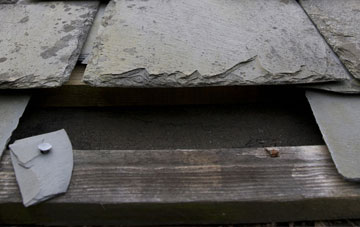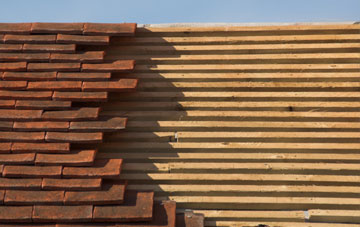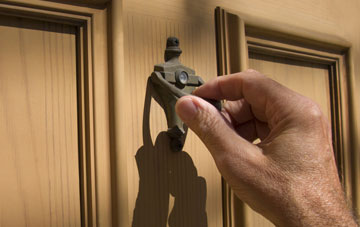10 Roofing Scams &
How To Avoid Them
Don't worry though - our roofers are all pre-screened!!
Save time & save money on ALL roofing work
Compare fully-approved, rated roofers today!
- Exclusive February deals
- Rated, trusted roofers
- 60sec online quote application
- Compare prices with no-obligation
Don't just take our word for it
4.5/5
(37 quotes - 21/02/26)
Worried about Roofing Scams? Watch for These 10 Red Flags
Table of Contents
When you need work done on your roof, it’s hard to know who to trust. In fact, now more than ever, homeowners across the country are being scammed out of their hard-earned money. If you’re worried about roofing scams, there are some things you can watch for to keep yourself safe.
Don't worry yourself too much though... all the roofers on our network are screened and rated for reliability and quality.


#1 – A Large Up-Front Deposit
When you hire a reputable roofing company, they won’t ask you to pay for your entire repair or replacement upfront. If you hire a roofing company for an inspection, you shouldn’t have to pay anything upfront. Many companies will request some form of upfront payment – usually enough to cover the cost of materials – but a request for anything more than this is a definite red flag that something isn’t right. In fact, in some countries, such as the United States, it’s considered illegal for a roofing contractor to ask for more than 33% of the total quoted repair or replacement cost as a deposit. In other countries, the maximum is 10%.
In the UK, there’s no law or industry standard that dictates how much a contractor should ask you to pay in the form of a deposit. The best way to protect yourself is to ask your roofing company about its policy for payment. If they request only a small upfront fee to get started, this is ideal. However, if they ask for more, don’t simply write the cheque or hand over your credit card. Do a little more research about the company itself to make sure it’s a well-known company that tends to get good reviews.
#2 – A Payment Schedule Based on Dates Instead of Milestones
Another thing you should watch for is how the company sets up your payment schedule following its receipt of your initial deposit. Most reputable companies will ask you to make additional payments once certain milestones have been reached to provide you with some peace of mind. This is because a time-based payment schedule doesn’t make much sense in the United Kingdom. After all, if you’re asked to pay a percentage of the total quote every week and it rains for a week straight, you’ll be making payments even though no work has been completed.

Before you pay your deposit, ask your roofing company how it expects to be paid throughout the course of the project. Some companies might not require any additional payment until the work is finished, and still others may ask you to make a payment after reaching a specified milestone. As an example, you may need to make another payment once the roofing contractor has finished removing your old roof, another once the shingles have been laid, and still another once the fascia and soffit have been repaired or replaced.

#3 – A Low Overall Quote in Exchange for Advertising
While it’s true that some roofing contractors certainly do provide discounts to homeowners who agree to advertise the company who repaired or replaced their roofs in their yards for a specified time, this should not reduce the overall bid by more than a couple hundred pounds. One of the most prevalent roofing scams not only in the UK, but also around the world, involves providing homeowners with an incredibly low bid if they promise to advertise their company. This seems very realistic; the company may even already have a lawn sign in hand. However, chances are good this company is going to do a poor job.
The best way to avoid this scam is to obtain quotes from multiple roofing companies. If one quote seems too good to be true, it usually is. You should never choose a company based solely on the quote it provides as this often leads to trouble. Do some additional research by looking up unbiased third-party reviews, and pay close attention to the satisfaction ratings. This will often tell you all you need to know about a company.
#4 – Lack of a Contractual Labour Agreement
Some con artists try to get on their victims’ good sides by offering to do the work without a contract and making it seem like this is for the benefit of the homeowner. You may even think it’s a great idea; if the contractor doesn’t do a good job, there’s no contract that says you should pay the full price. Scammers don’t do this to benefit you; they do it to benefit themselves. This will allow them to effectively do whatever they want after they’ve collected your initial deposit. Perhaps you wanted more expensive slate tiles on your roof and you paid the company to purchase them. If you come home one day to discover asphalt shingles, instead, you won’t be pleased. Unfortunately, if there’s no contract showing exactly how much you paid for a very specific service, you’ll likely be out of luck when it comes to getting a refund.

Never agree to hire a contractor who tries to make you happy by skipping the contract. Always request a contract, and always read it carefully before you sign. If your contractor refuses, even after you’ve asked, don’t hire that contractor. Along these same lines, if permits are required for your project, make sure your contractor has them before doing any work. Don’t let any contractor talk you out of getting those permits

#5 - Door-to-Door Sales Following Natural Disasters
The UK is certainly no stranger to severe weather, and this means that it’s a prime target among the real con artists who’ve never worked on a roof a day in their lives. Their modus operandi? They go door-to-door in neighbourhoods impacted by tornadoes, high winds, and hailstones offering their services at a discount. They’ll even say how sorry they are that you’ve experienced this, and they’ll tell you they’ve come from miles away just to provide a discounted service. They’ll ask for a very small down payment - usually only a couple hundred pounds - right there on the spot. They’ll collect this from numerous people, then skip town, never to be seen again.
There’s one very good way to avoid this scam - never give money to a contractor who knocks on your door or rings your telephone out of the blue. Make sure you’re the one in charge by contacting roofing contractors on your own. This way, you can decide which company you want to hire, and you can do your research beforehand to make sure you’ve chosen a reputable company that won’t end up ripping you off.
#6 - Disappearing Roofers
Before you even pay your initial deposit, your contractor should provide you with a suggested schedule for the completion of your project. Of course, things won’t always go exactly according to the plan because the weather can be quite unpredictable. After you’ve paid your deposit, your contractor should stick to that schedule, weather permitting, as often as possible. If you’re regularly looking out the window on a sunny day and wondering why your roofing contractor isn’t working, you may have a con artist on your hands. Some fraudsters will collect a down payment, show up once or twice, and then simply vanish into thin air.

While there’s no sure-fire way to avoid this scam, the best thing you can do is research the roofing companies thoroughly. For example, if you submit a quote request through a roofing network, and three different companies contact you with quotes, research each one of those companies very carefully. Avoid believing the testimonials you see on their websites because these are often written by professionals rather than actual companies. Instead, find unbiased reviews on consumer awareness websites and networks, and read these carefully. Companies that regularly leave their paying customers high and dry should be avoided at all costs.

#7 - Extra Pressure to “Act Now”
Scammers aren’t stupid, and they know they need to get their feet in the door early on. As such, many of them will use what experts refer to as “high pressure tactics” to force you out of your money before the either disappear or provide you with sub-par work. A common scenario involves a consumer contacting a roofing company at random because it was in the telephone directory or list of local roofers online. The representative may ask if you’ve received other bids, and you’ll say yes or no.
If you say no, you have not received other bids, the representative will produce a quote, but tell you that you must pay a deposit right away with your credit card because it’s a limited-time offer. If you say yes, you have received other bids, the representative will likely offer you a “we will not be underbid” spiel and, of course, a lower bid. Again, the representative will tell you that you must act now and pay for the service over the phone or online with your credit card; otherwise, you’ll forfeit the offer.
A reputable roofing company will never ask you to pay for anything directly over the phone or internet without at least consulting with you first, so keep that in mind. What’s more, most roofers will not actively work to beat other companies’ quotes. If they quote more than a competitor and you bring this up, they will likely explain why they charge more - not retract the original bid and offer you something well below your lowest offer.
#8 - A Price that Keeps Changing
Scammers are often desperate for your money, and if you pay close attention, you can sometimes pick up on that desperation. One of the biggest red flags that you’re about to become the victim of a roofing scam is the fluctuating price, or what some experts call the “elevator ride”. In this type of scam, the fraudster will offer you a quote that is far lower than the rest of the companies in the area to entice you. Once the work starts, the company will keep running into “trouble” that requires more and more money. Pretty soon, you’ve paid far more to this company than you would have paid to any of its competitors, even though nothing is really getting done.

Professional roofing companies keep themselves busy year-round, and they’re never truly “desperate” for your business. What’s more, they’ll quote you an accurate cost for the overall project before they even get started. Although things can and do sometimes happen that will cause your costs to go up (for example, the company may find rotted trusses upon removing the roofing material), it’s actually quite rare. The best companies will discuss this with you beforehand, too. They’ll quote you a price, but they’ll also mention some other things they may find, based on your unique project, that could cause that price to climb.

#9 - Insurance Cheque Collectors
When damage to your roof is covered under your homeowner’s insurance policy, and you file a claim for your repairs, that company will usually issue you a cheque to cover the initial costs of getting started. The homeowner is expected to use this money to hire a contractor, who will then complete the work and bill the insurance company once the project is finished. Unfortunately, scammers are aware of these cheques, and this is what they want to get their hands on. They’ll show up, quote you a great price, and in some cases even have you sign a contract - then immediately cash the cheque and disappear without a trace.
The best way to avoid this scam? Don’t hand over your insurance cheque right away. While it’s not uncommon for even the best roofing companies in the country to ask for a deposit, they shouldn’t expect you to pay that deposit until they’ve delivered your supplies. Once you see shingles, tar, asphalt, or whatever roofing materials are necessary for finishing the job on your property, that’s when you provide the down payment. If nothing else, at least you have the materials available to you if the contractor simply doesn’t come back.
#10 - Identity Theft Scams
Finally, just as it’s crucial to be careful with your money, you should be just as careful with your identity. In some cases, the fraudsters aren’t interested in collecting your insurance cheque or your down payment - they just want your National Insurance number, your birthdate, your address, and your bank account information. That’s all they need to drain your accounts, sign up for credit cards in your name, or even claim tax credits and benefits. While you can recover from the theft of a few hundred pounds, getting your life back after identity fraud can take months or even years.

Avoiding identity theft is relatively simple. Reputable contractors will never ask you to “apply” for their services, and contractor networks that match you with local roofers in your area should never ask you to provide personal information like your date of birth, NI number, or anything of the sort unless you’re applying for a loan to finance the cost of your project.
In Conclusion
Roofing scams aren’t uncommon in the UK, and this means that thousands of people fall victim each year. The 10 red flags listed above will help you avoid fraud and ensure you hire a reputable company who will work hard to provide you great service at a great price, too.
SAVE UP TO 50%
ON ALL ROOFING JOBS
For exclusive February deals complete our form now!